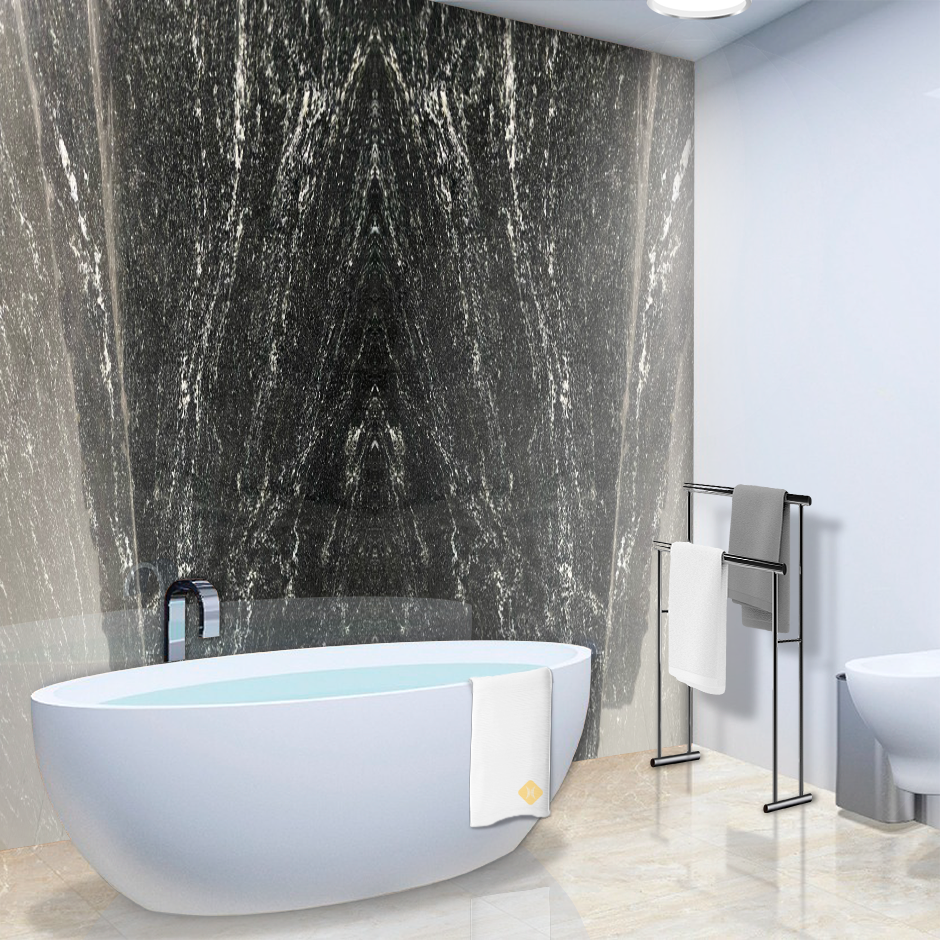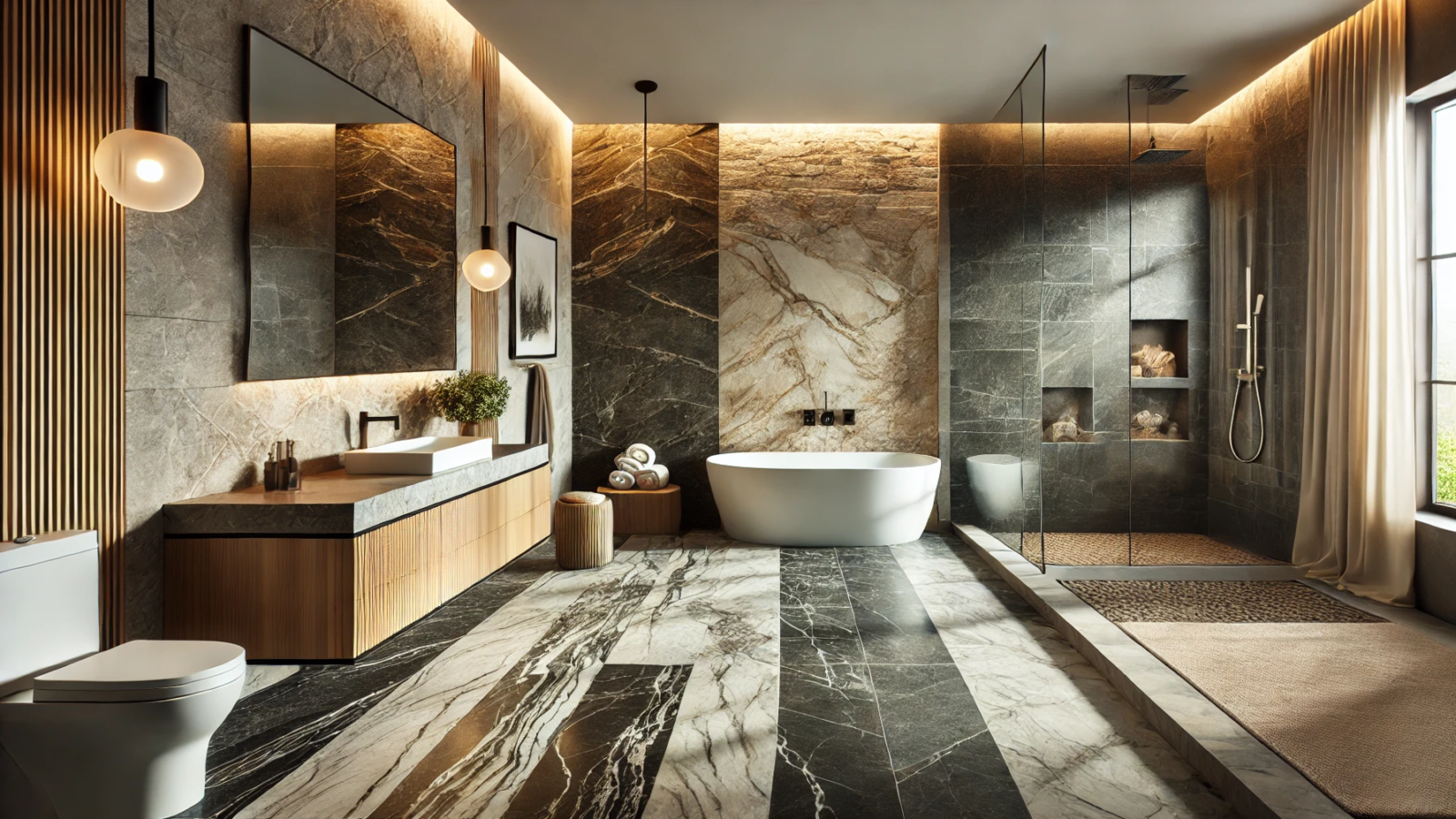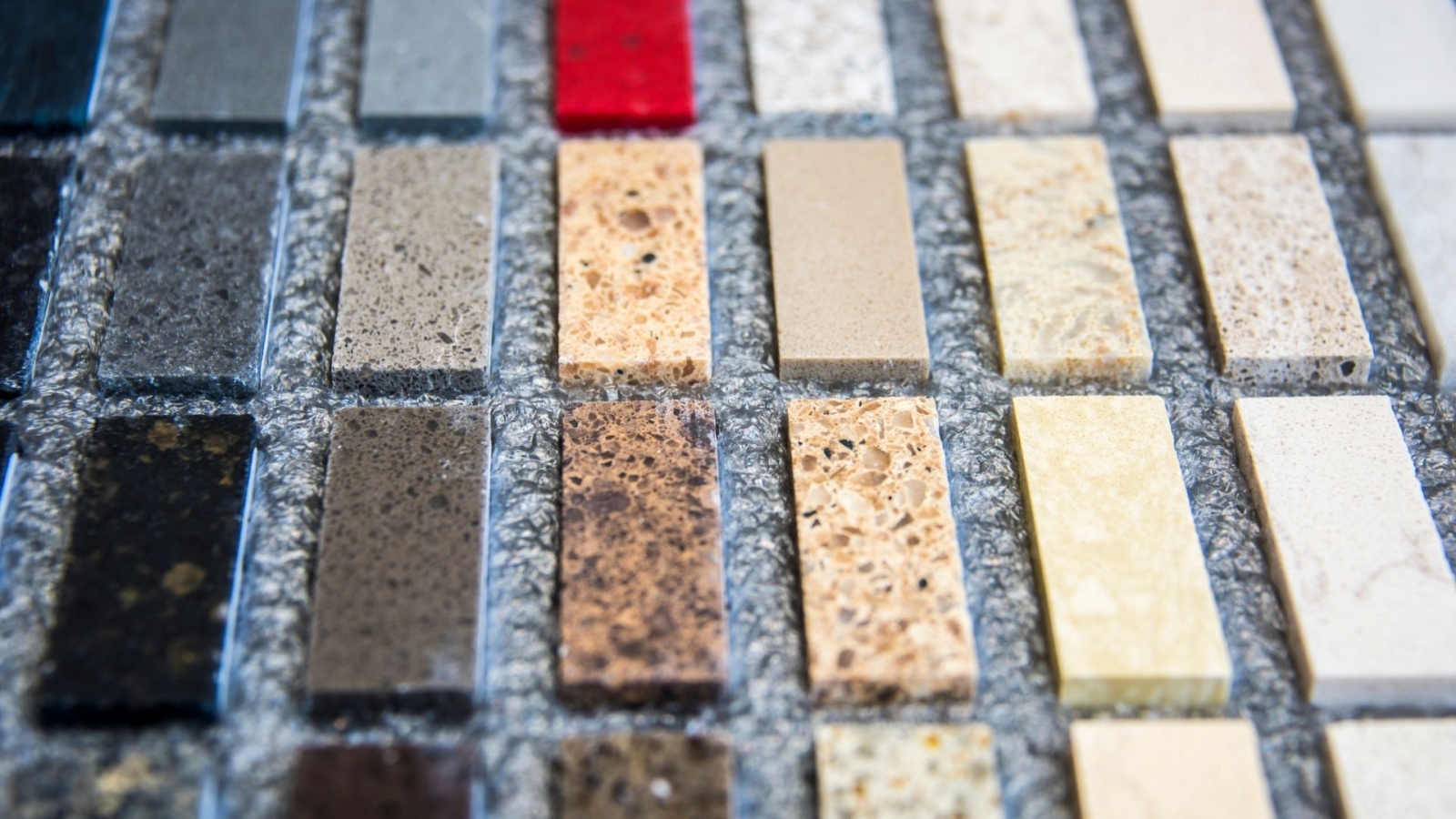Best Stones for Bathroom
Durable, Affordable, and Stylish Choices for Every Budget
Choosing the best stones for the bathroom is crucial when designing or renovating a bathroom. Bathrooms are high-moisture areas that require durable, low-maintenance, and stylish materials. With so many options available, it’s essential to consider factors like affordability, scratch resistance, cleaning ease, germ absorption, and style trends.
Below, we explore the best stones for bathrooms and their pros and cons, helping you make an informed decision.
1. Granite –
Highly Durable and Luxury Choice

Best for: Luxury bathrooms, durability, and low maintenance.
Price Range: High
Granite is one of the most durable stones, resistant to scratches, stains, and moisture. It does not absorb germs easily, making it a hygienic option. The natural veining and patterns offer a luxurious look, making it a high-end choice for countertops, floors, and shower walls.
🔹 Pros:
✔ Extremely durable and scratch-resistant.
✔ Minimal maintenance; requires sealing but is easy to clean.
✔ Heat and moisture resistant.
✔ Adds value to your home due to its luxurious appeal.
🔸 Cons:
✖ Expensive compared to other options.
✖ Heavy and may require professional installation.
Learn more about Granite stone
2. Marble – Elegant and High-End, But Requires Care
Best for: Luxury and classic aesthetics.
Price Range: High
Marble is a timeless and luxurious choice known for its veining and high-end appeal. However, it is prone to scratches, stains, and moisture absorption, requiring frequent sealing and maintenance.
🔹 Pros:
✔ Stunning visual appeal, perfect for luxury bathrooms.
✔ Unique veining makes each slab one of a kind.
✔ Adds significant property value.
🔸 Cons:
✖ Absorbs moisture and stains easily.
✖ Requires sealing and regular maintenance.
✖ Scratches easily compared to granite.
3. Quartz – Best Low-Maintenance and Scratch-Resistant Option
Best for: Modern, minimal, and easy-to-maintain bathrooms.
Price Range: Mid-to-High
Quartz is engineered stone, making it highly resistant to moisture, stains, and scratches. Unlike natural stones, it does not require sealing and is one of the easiest surfaces to clean, making it ideal for busy bathrooms.
🔹 Pros:
✔ Non-porous, making it germ-resistant.
✔ Does not require sealing.
✔ Scratch and stain-resistant.
✔ Available in a variety of colors and styles.
🔸 Cons:
✖ Can be expensive, though cheaper than marble.
✖ Not as heat-resistant as granite.
4. Travertine – Affordable but High Maintenance
Best for: Mediterranean and rustic-style bathrooms.
Price Range: Mid-range
Travertine offers a warm, natural, and rustic look, often seen in spa-inspired bathrooms. However, it is porous and absorbs moisture, requiring frequent sealing.
🔹 Pros:
✔ Affordable compared to marble and granite.
✔ Offers a unique, rustic charm.
✔ Comfortable underfoot for flooring.
🔸 Cons:
✖ Porous and can absorb germs if not sealed properly.
✖ Requires frequent sealing and maintenance.
5. Slate – Best for Slip-Resistance and Minimalist Look
Best for: Modern and rustic bathrooms, slip-resistant floors.
Price Range: Mid-to-High
Slate is a durable and slip-resistant stone, making it ideal for bathroom floors. It is naturally water-resistant and low-maintenance, making it a great option for wet areas.
🔹 Pros:
✔ Excellent slip resistance.
✔ Durable and scratch-resistant.
✔ Low maintenance if sealed.
🔸 Cons:
✖ Can chip over time.
✖ Needs sealing to prevent moisture absorption.
6. Limestone – Soft but Elegant for a Warm, Natural Look
Best for: Earthy and warm-toned bathroom designs.
Price Range: Mid-range
Limestone offers a soft, organic look but is more porous than other stones, requiring proper sealing to prevent moisture absorption.
🔹 Pros:
✔ Affordable compared to marble.
✔ Warm and natural aesthetic.
🔸 Cons:
✖ Scratches and stains easily.
✖ Requires frequent sealing.
7. Onyx – High-End and Trendy, But Fragile
Best for: Ultra-luxury and decorative bathroom spaces.
Price Range: High
Onyx is a visually stunning stone often used for statement bathroom walls and vanities. However, it is fragile and requires a lot of maintenance.
🔹 Pros:
✔ Unique, high-end, and luxurious appearance.
✔ Can be backlit for a dramatic effect.
🔸 Cons:
✖ Expensive and fragile.
✖ Requires sealing and careful maintenance.
Which Stone is Best for Your Bathroom? (Comparison Table)
| Stone | Affordability | Durability | Scratch Resistance | Maintenance | Germ Absorption | Style | Luxury Level |
|---|---|---|---|---|---|---|---|
| Granite | Expensive | Very High | High | Low (requires sealing) | Low | Classic & Luxurious | ⭐⭐⭐⭐ |
| Marble | Expensive | High | Low | High (requires sealing) | High | Elegant & Luxurious | ⭐⭐⭐⭐⭐ |
| Quartz | Mid-to-High | High | Very High | Very Low | Very Low | Modern & Minimal | ⭐⭐⭐⭐ |
| Travertine | Mid-range | Medium | Medium | High (requires sealing) | High | Rustic & Natural | ⭐⭐⭐ |
| Slate | Mid-to-High | High | High | Low | Low | Modern & Slip-Resistant | ⭐⭐⭐⭐ |
| Limestone | Mid-range | Medium | Low | High | High | Warm & Earthy | ⭐⭐⭐ |
| Onyx | Very Expensive | Low | Low | Very High | Medium | Ultra-Luxurious & Trendy | ⭐⭐⭐⭐⭐ |
Final Thoughts: Which Stone Should You Choose?
- For luxury bathrooms: Marble, Onyx, or Granite.
- For affordability with durability: Travertine, Limestone, or Slate.
- For easy maintenance and hygiene: Quartz or Granite.
- For a modern, trendy look: Slate or Quartz.
- For slip-resistant bathroom floors: Slate or Textured Travertine.
Choosing the right stone depends on your budget, style preference, and maintenance willingness. If you want high durability with minimal upkeep, quartz or granite are the best choices. If you prefer a high-end aesthetic, marble or onyx will create a luxury experience.

